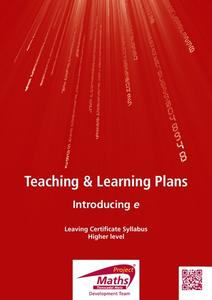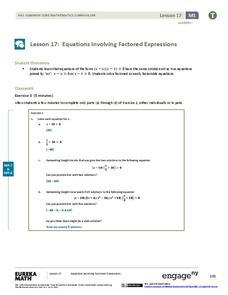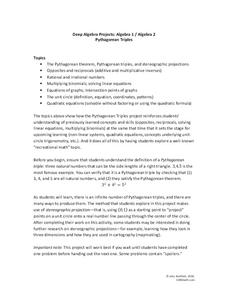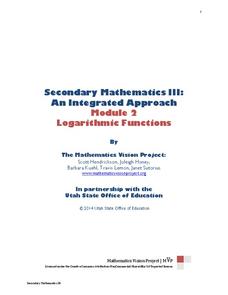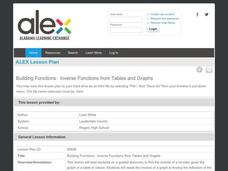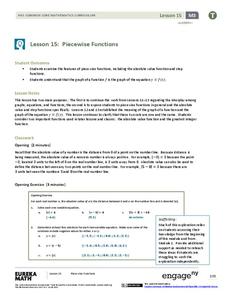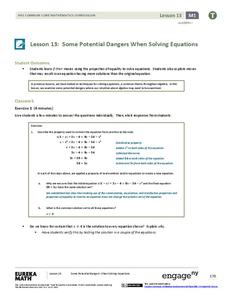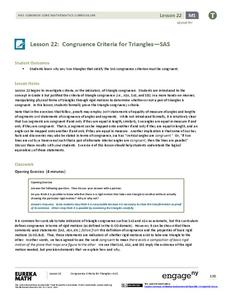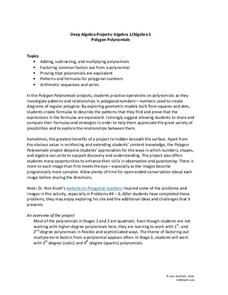EngageNY
Solution Sets to Inequalities with Two Variables
What better way to learn graphing inequalities than through discovering your own method! Class members use a discovery approach to finding solutions to inequalities by following steps that lead them through the process and...
Project Maths
Introduction to e
First there was pi and now there's e. A discovery-based lesson helps learners find a pattern in compound interest as the compounding period changes. Their investigation results in the discovery of the number e. The lesson is the first in...
EngageNY
Equations Involving Factored Expressions
Be ready mathematicians of every level. This lesson leads to the discovery of the zero product property and provides challenges for early finishers along the way. At conclusion, pupils understand the process of using the zero product...
Math Solutions
Factor Game
Learning about factors and multiples is all fun and games with this simple math activity. The lesson begins with the teacher and class playing the Factor Game together as students figure out the rules and uncover key...
EngageNY
Equations Involving a Variable Expression in the Denominator
0/0 doesn't equal 0! Begin this lesson by allowing the class to explore the concept of dividing by zero. The introduction allows for discovery and provides meaningful examples of dividing by zero. This understanding leads to solving...
EngageNY
Using the Quadratic Formula
What is the connection between the quadratic formula and the types of solutions of a quadratic equation? Guide young mathematicians through this discovery as they use the discriminant to determine the number and types of solutions,...
West Contra Costa Unified School District
Introduction to Inverse Functions
Ready to share the beauty of the inverse function with your classes? This algebra II lesson guides the discovery of an inverse function through a numerical, graphical, and an algebraic approach. Connections are made between the three,...
5280 Math
Pythagorean Triples
From Pythagorean triples to the unit circle. Learners use the Pythagorean Theorem to find Pythagorean triples and then relate their work to the unit circle in a fun algebra project. Their discovery that x^2+y^2 is always equal to one on...
Vancouver Community College Learning Centre
Symmetry & Odd/Even Functions
This straightforward worksheet provides learners with valuable practice in identifying different symmetries of functions. Brief, but thorough explication at the front of the worksheet guides and reminds learners of the techniques...
CK-12 Foundation
Exponential Properties Involving Quotients
Watch as exponential expressions expand and contract! An interactive tutorial leads young mathematicians to the discovery of the quotient property of exponents. Through exploration, they realize that an x in the numerator will cancel an...
EngageNY
Modeling with Quadratic Functions (part 2)
How many points are needed to define a unique parabola? Individuals work with data to answer this question. Ultimately, they determine the quadratic model when given three points. The concept is applied to data from a dropped...
EngageNY
First-Person Computer Games
How do graphic designers project three-dimensional images onto two-dimensional spaces? Scholars connect their learning of matrix transformations to graphic design. They understand how to apply matrix transformations to make...
EngageNY
Solution Sets to Equations with Two Variables
Can an equation have an infinite number of solutions? Allow your class to discover the relationship between the input and output variables in a two-variable equation. Class members explore the concept through tables and graphs and...
Mathematics Vision Project
Module 2: Logarithmic Functions
Build a solid understanding of logarithmic functions and equations. Five lessons in the module begin by developing the concept of a logarithm. The next lessons address graphing logarithmic functions, logarithmic properties, and solving...
EngageNY
Scientific Notation
Young mathematicians learn how scientific notation is meant to save time. Part 10, out of a series of 15, asks scholars to recognize the correct use of scientific notation and finish by adding and subtracting numbers using...
Alabama Learning Exchange
Building Functions: Inverse Functions from Tables and Graphs
Is the inverse a function? Scholars learn how to examine a function to answer this question. Using an online interactive, they examine the properties of inverse functions to compare to the original function.
EngageNY
Composition of Linear Transformations 1
Learners discover that multiplying transformation matrices produces a composition of transformations. Using software, they map the transformations and relate their findings to the matrices.
EngageNY
Piecewise Functions
Show your class members that if they can graph a linear function, they can graph an absolute value function. Groups create an absolute value graph using a table, then entertain the idea of an absolute value function defined as two...
EngageNY
Some Potential Dangers When Solving Equations
Need a less abstract approach to introducing extraneous solutions? This is it! Young mathematicians explore properties used to solve equations and determine which operations maintain the same solutions. They...
EngageNY
Congruence Criteria for Triangles—SAS
Looking for a different approach to triangle congruence criteria? Employ transformations to determine congruent triangles. Learners list the transformations required to map one triangle to the next. They learn to identify congruence...
5280 Math
Polygon Polynomials
Patterns in polygons lead to patterns in polynomials. Presented with a series of polygons, individuals create polynomial expressions to represent their patterns. The algebra project consists of nine problems that incorporate polynomial...
CK-12 Foundation
Simplifying Rational Expressions: Sliding Solver
Build a strong understanding of simplified rational expression with your classes. An interactive lesson helps scholars discover the equality between the original expression and the simplified expression. Questions help individuals focus...
Mathematics Vision Project
Module 7: Structure of Expressions
The structure of an expression is a descriptive feature. Learners build a solid understanding of quadratic functions using an analysis of expressions in different forms. The seventh module in a series of nine includes 12 lessons...
Massachusetts Department of Education
Similarity through Transformations
Create the ultimate miniature golf course. The 93-page model curriculum unit from the Massachusetts Department of Elementary and Secondary Education contains nine lessons on understanding similarity in terms of both Euclidean geometry...

